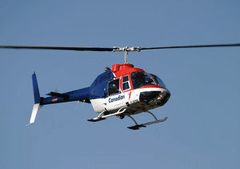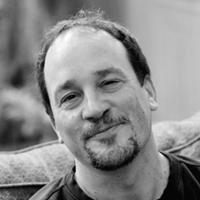
For North American stock investors, good news is as infectious as a Burmese malaria outbreak during typhoon season.
So when the good news appeared for Richmond B.C.'s CHC Helicopter Corporation on Oct. 12, shares jumped over $1.20 on the Toronto Stock Exchange. The market was responding to an announcement confirming $180 million worth of new contracts to provide oil and gas exploration support in Nigeria, the Philippines, Namibia and Kazakhstan.
By all counts, the future of CHC Helicopters is bullish; the company announced revenues of over $1 billion in September, the eighth consecutive year of record revenues. Feeding this growth is a vast international cast of shareholders, including Canadian banks, North American mutual fund companies, and CHC's largest institutional shareholder, the Ontario Teachers Pension Fund.
Yet a closer look at how CHC has grown reveals a company that has aggressively courted customers and government partners in countries where most other corporations would never dare to tread. This year CHC appeared alongside Ivanhoe Mining Ltd. on the 2007 "Dirty List" representing two of the last publicly-traded BC companies profiting from operations in Burma.
Prosperity in South-East Asia
CHC's Global Operations are focused on providing transportation services to onshore and offshore oil and gas exploration/production for a who's who of multinational oil companies, including Chevron, BP, Royal Dutch/Shell Group, and ExxonMobil. Over 40 per cent of this activity is currently in Africa, and nearly 20 per cent in Asia, including Burma.
CHC's presence in Burma -- through its Canadian Helicopters International (CHI) division -- dates back to at least August 1997, when CHI signed an accord with Burma's Ministry of Transport to create Myanmar Helicopters International Co Ltd. CHC signed a contract for services with Unocal in Thailand during that same year, as well as a five-year contract with Total Myanmar Exploration and Production for oil and gas support in Burma.
According to Ottawa-based non-profit Canadian Friends of Burma (CFOB), it was during this time that CHI provided helicopter services for French oil company Total, for its work on the Yadana-Yetagun pipeline constructed between eastern Burma and Thailand from 1996 to 1998.
Fifteen Burmese villagers eventually sued one of Total's pipeline partners, American oil company Unocal in U.S. courts, alleging thousands of villagers were used as forced pipeline construction labour by the Burmese military, thousands forcibly relocated to secure a project corridor, and serious human rights abuses committed by military forces hired as security for the pipeline. Unocal eventually settled out of court in 2005, awarding the villagers a confidential cash settlement. CHC was never implicated or accused of wrong-doing in this case.
By August of 2003, CHI had a total staff of 30 working on the ground in Burma, with two aircraft operating between Yangoon and Kanbauk in support of both Total Oil and Premier Oil. This was in addition to a six day a week Twin Otter service between Yangoon, Kanbauk and Dawei. In 2004 CHC was awarded new contracts to provide ongoing helicopter services in support of oil and gas operations of Total Exploration and Production in Burma.
Support of Ontario Elementary and High School Teachers
As a publicly-traded public company on both the TSE and the New York Stock Exchange, shares in CHC Helicopters are widely held around the world. But by far the largest shareholder is 47-year-old board chairman Mark Dobbin, the son of deceased founder Craig L. Dobbin.
Outside of the family, the largest institutional shareholder is the Ontario Teachers Pension Plan (OTPP), which on June 30 of this year reported ownership of over 2 million shares in the company, worth over $53 million (US). The fund invests and administers pensions on behalf of 271,000 active and retired Ontario elementary and high-school teachers, managing $106 billion in real estate, government bonds, and stock.
When asked about its investment in CHC Helicopters, OTPP communications officer Carol Dunsmore told The Tyee by e-mail that the fund's hands are tied when it comes to ethically screening companies.
"According to law, pension plans cannot select or exclude investments on the sole basis of social, environmental, political, or any other non-financial criteria," she wrote. "When selecting investments, part of our due diligence process is to consider the [non-financial] factors on a company's long-term performance. But, again ... the pension fund's investments must be in the best financial interests of the pension plan members.
The law Dunsmore refers to is not Canadian law, but a common law precedent established in England in 1984. It is based on the case of coal miners who demanded that their pension fund divest from oil companies, which were perceived as competitors and a threat to their livelihood. The judge ruled that pension fund trustees must treat interests of beneficiaries as paramount, and defined these best interests as primarily financial.
Dunsmore also wrote that if OTPP members wanted to avoid specific investments and were willing to risk earning lower returns, teachers (through the Ontario Teachers' Federation) would have to first agree on what are acceptable investments, and then convince the Ontario government (the other plan sponsor) to officially change the rules.
Looking at the bigger picture, a quick scan of the stock holdings of the Canadian Pension Plan (CPP) demonstrates that the OTPP is no different than other plans when it comes to not screening investments. Stocks bought by Canadian citizens through CPP contributors include tobacco, weapons manufacturers, oil sands, coal and mining, including almost five million shares of B.C.'s Ivanhoe Mining Ltd., worth $67 million alone.
Not only are working and retired Ontario teachers unable to screen where their retirement money goes, they are unable to wield the collective shareholder power to improve the social and environmental practices of their investments.
The OTPP's Proxy Voting Guidelines effectively neuter the mammoth shareholder voting power that comes with being a long-term stockholder of over 1100 publicly traded companies around the world.
The guidelines state that the pension fund, when voting on resolutions at company AGMs, will "generally not support proposals that ... create a wide range of peripheral considerations the directors must take into account in evaluating a business proposal."
Out of Iraq, Into Chad
In addition to its ongoing activities in Burma, the company currently has contracts in Nigeria, Chad, Venezuela, the Philippines and up until this fiscal year, Somalia -- all regions that Foreign Affairs and International Trade Canada currently advises Canadian citizens to entirely or in part avoid.
Regarding its oil and gas activities, CHC Helicopters Corp. marketing analyst Natalie Haywood told The Tyee that the company has a code of ethics that is applicable to all operations worldwide, but that this policy does not guide where the company decides to operate. She added the company does not yet have a corporate social responsibility policy.
In the cases where the company is not engaged in oil and gas operations in or around the planet's volatile states, it is often on the front lines of humanitarian aid, providing helicopter services to the United Nations. Over the last 15 years, the company has assisted UN actions in Bosnia, East Timor, Somalia, Rwanda, Haiti and even Iraq, where the company provided support for UN monitoring, verification and inspection activities late into fiscal 2003.
Related Tyee stories:
- Canadian Miners Sour on Burma
Ties with junta earned millions for BC-based Ivanhoe. - Pensions Deep into Weapons, Toxins, Sweatshops
The Canadian Pension Plan makes no apologies for its big shift into stocks, including Walmart and 15 top military contractors. - Are You a 'Global Citizen'?
Really? What does that mean?















Tyee Commenting Guidelines
Comments that violate guidelines risk being deleted, and violations may result in a temporary or permanent user ban. Maintain the spirit of good conversation to stay in the discussion.
*Please note The Tyee is not a forum for spreading misinformation about COVID-19, denying its existence or minimizing its risk to public health.
Do:
Do not: